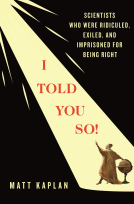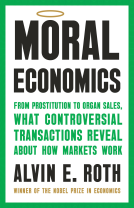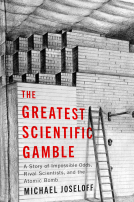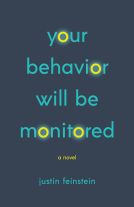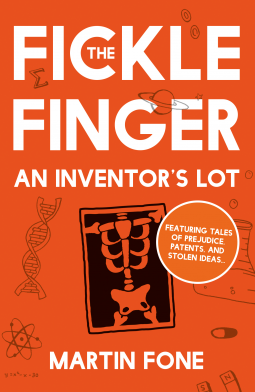
The Fickle Finger
An Inventor’s Lot
by Martin Fone
This title was previously available on NetGalley and is now archived.
Send NetGalley books directly to your Kindle or Kindle app
1
To read on a Kindle or Kindle app, please add kindle@netgalley.com as an approved email address to receive files in your Amazon account. Click here for step-by-step instructions.
2
Also find your Kindle email address within your Amazon account, and enter it here.
Pub Date Jan 06 2020 | Archive Date Feb 14 2020
Troubador Publishing Ltd. | Matador
Talking about this book? Use #TheFickleFinger #NetGalley. More hashtag tips!
Description
Success is a slippery, fickle thing. How much is down to luck, being in the right place at the right time or knowing the right people, and how much to innate talent? Why are some people less successful than others? Taking as its frame of reference the stories of fifty inventors who lost out on the fame that their genius might otherwise have merited, The Fickle Finger examines some of the reasons why they have languished in obscurity for so long. It is a tale of prejudice, racial and sexual, societal pressures, deficiencies in the patent system, gross errors of judgment, and sheer bad luck. The pressures of battling the system sometimes led to madness, penury and even suicide.
And along the way, there will be some surprises. Were the Wright Brothers really the first men to fly in a powered machine? Did Galileo really invent the telescope? Has a US President held a patent? How did Albert Einstein hope to improve upon the fridge? Why was Benjamin T Franklin denied a patent? Who gave away their invention for a lifetime’s supply of chocolate?
The answers to these questions and much more are to be found within this book. A lively, entertaining and light-hearted investigation into the components of success, it will give you plenty of food for thought.
A Note From the Publisher
Available Editions
| EDITION | Ebook |
| ISBN | 9781838598013 |
| PRICE | $2.99 (USD) |
| PAGES | 200 |
Average rating from 9 members
Featured Reviews
 Mike D, Reviewer
Mike D, Reviewer
The fickle finger of fate isn’t just an awesome alliteration, it’s a way of life. Or, more accurately, a mentality with which to approach life. There are things one can do to improve one’s lot, but there’s only so much one can do, the rest is up to fate. Such is very much the case with the 50 inventors in this book. They’ve tried to do more than improve their own lot, they’ve invented things ranging from minor like Velcro to major like nuclear fusion and yet never got the credit they deserved. And while, yes, the modern age finally granted (often posthumous) recognition to their genius, their names are still not as famous as they ought to be. This book tries to redress it in a way. Without a glimpse of schadenfreude at lives that frequently went off the rails in pretty tragic manner, the book presents 50 brief biographical chapters chronicling the lives of historically ignored and overlooked inventors and their inventions. Some of it is depressingly obvious, if these inventors were women, men of color or slaves, the odds were stacked impossibly against them. But there were also plenty of properly recognized within their rights (i.e. white male) citizens who struggled to get their inventions on the market whether through crappy timing, lack of business acumen, unfair competition or various combinations of thereof. Some of this is legitimately laugh out loud funny…just imagine the original inventor of inline skates rolling into a fancy parlor while playing violin…and having no idea how to slow his roll as it were. But mostly these are very sad stories about smart, often genius minds plowed over by the vagaries of life. Notably, the book isn’t nearly as bleak as it might have been, thanks to the light tone the author selected for his narration. Worked very well, actually. Managed to be informative and charming at the same time. The author presents himself as a sort of good natured good humored old fogey fascinated by a fascinating subject and excited to shed some much deserved light on the people responsible for so many of our life’s comforts and conveniences. This was exactly my kind of nonfiction, educational and entertaining. Relatively slim volume with tons of information, made for a quick, fun, edifying read. I’d be very interested to read more by the author based on this most auspicious introduction. Recommended. Thanks Netgalley.
Fun read on inventions and the associated pitfalls
I enjoyed this book. It is a fun read with Martin Fone giving short, well-written descriptions of inventions and their inventors. Except that these are inventions that didn’t work out quite like the inventor might have wanted them too. There is certainly humor in the book, as well as sadness and I couldn’t help but feel bad for some of the inventors. Overall this is a book well-worth reading.
I had little knowledge of patents and always thought once somebody has got one; he can encash his idea easily for many years.
But things are not that simple.
World is a cruel place and it is rarely fair when we see things in retrospect.
This is a lovely concise book, telling stories of 50 inventors who produced great things but still did not get adequate money, fame or awards or place in history what they deserved.
Few stories were well known from bestsellers books and common knowledge and opinions.
But I learnt a lot of new things and about a lot of great people on margins of society.
Their were biases; racial, sex based, financial or beauraucratic and even from patent office.
It is amazing to know that patent offices may be biased or amenable to manipulation.
One common fact was that ideas don't work if there is nobody to fund them.
Second was that if you are naive and honest odds are against you as hawks will circle you to take away your possession.
I will like to read other books by author.
Writing is concise, intresting, enjoyable and informative.
Thanks netgalley and publisher for review copy.
This was an interesting read, as the author described the inventors' experiences for things that I wouldn't have thought to research. It was interesting to see how some of these inventions came about and the setbacks the inventors faced. Overall, this is a great read!
Martin Fone has collected stories of 50 individuals who had made great contributions to science, technology and innovation, yet for one reason or other, were denied the fruits of their invention. Even in couple of instances when they did achieve, it was only after long struggle and hardship, mostly with a heavy loss to their physical and mental health. Note that here ‘invention’ is used in a broad sense and not necessarily technological innovation. Even before starting the book, one should appreciate the effort that Martin has put in to gather these names and their stories, and explore and collect corresponding factual details. It was a Herculean task I would say. Honestly speaking, I was not aware of most of these stories, not even about concepts and people from my own field of education. For me, the reading experience was illuminating and depressing at the same time.
Now let us come to the book. This review is based on the Kindle edition, and I should make a special mention of the beautiful formatting, which to me is rarely seen with books I receive for review! I am sure that the paperback edition must also be good looking. The book starts with introduction to the book, and is extremely well written. It prepares you for the material inside by stressing the importance of technology, and then tells about the various hardships and suffering faced by innovators. It also draws a road map for the reader by giving an outline of how the book has been arranged. The language is beautiful, and Martin does not throw unnecessary words. The result is a text which is straight, accurate and focused.
Let me give you an outline of the book. Part One of the book tells you about experiments which resulted in accidents and failed, then the lesser known inventions by people who are famous for their other works (like Lincoln and Einstein), and finally inventors who recognised the merits of their work and didn’t use it for financial gains, instead gave it all away for betterment of humankind, the foremost of them being Rontgen (of X-Ray fame). Part Two deals with discrimination — sexual and racial. Part Three is the most depressing part; it narrates 8 instances where ideas were stolen or copied or slightly modified and patented, then tells about cases where nobody gave attention to the idea of the inventor. Part Four is all about difficulties and complexities of the patent process. In fact, patent is the current which runs through the whole book — Martin explains all the intricacies of the patent process and the various ways it has been manipulated and bypassed.
Interestingly the book starts with amusing stories, or rather schadenfreude, where you can’t decide whether to laugh or cry or bang your head against a wall. But things start getting serious after the second chapter. Each section starts with a general introduction before telling the stories of the inventors in that section. The chapters are short and can be gone through in about 15 – 30 minutes at a normal pace.
Now let us come to the points which have stopped me from giving this book a full 5-star rating. Though there was plenty of scope for it, for some reason the author chose not to include any figures or photos. In certain chapters, the discussion does become elaborate and here a diagram could have helped. Likewise while he gives a detailed description of a device, it is still not clear what it might have looked like. Here a sketch was required. If nothing else, at least photographs/portraits of the inventors could have been included. It would have made the book more lively and appealing. Without graphics, such books become dull and have limited acceptance among potential readers.
Then there are few typographical errors, which could be removed by another proof reading or may be in the revised edition. However, they being very few in number, I would rather ignore them.
As I noted earlier, the various descriptions are concise, accurate and straight. Martin does not waste words. He is here to tell the stories, arranged in a logical order, and accomplishes the task. I got a sense that the first few chapters were written meticulously with great care and attention to language and choice of words. This is in line with the stated objective of the book to narrate these stories to the reader in an entertaining, pleasurable way. But as the book progresses, that sheen is slowly lost, there is a sense of hurry as the writer simply rushes you through the core story and gets away with it. No, he does not compromise on the details or the facts. In fact, he maintains the accuracy of the narrative throughout the book. At the same time, the beauty and charm of the description in the first few chapters is lacking in later chapters.
One possible inaccuracy does attract my attention. At the end of the chapter on Ludwig Boltzmann, Martin says,
“Ironically, shortly after his death, discoveries in atomic physics such as Brownian Motion, the random movement of particles in a liquid or gas which can only be explained by statistical mechanics, reinforced the primacy of atomic theory and established Boltzmann’s work as the cornerstone of modern-day physics.”
This requires fact checking. Einstein had given his explanation of Brownian motion in his miraculous year, i.e., 1905. It implies that Brownian motion must have been known much before that year; in fact it was described in 1827 by Scottish botanist Robert Brown. But Boltzmann had committed suicide in 1906. So both the ‘discovery’ as well as the explanation of Brownian motion happened 'before' Boltzmann’s death, and not 'after' that. I guess Boltzmann had not seen Einstein’s paper, else he would have stayed back. Or may be not, given his poor mental health.
There is a fear that people having aversion to science would get yet another reason to stay away from science and look at the field with scepticism and disbelief. Researchers on the other hand may get depressed by reading about the different ways they might be exploited and harassed, and denied the recognition they deserve for all the effort they have put in. But to be optimistic, this book makes them aware and alert that the field is not so flawless as it is generally projected. If they keep a watch on their interests, then the risks involved certainly would reduce to a great extent.
This is an important book both for people with innovative bend of mind as well as general audience. It needs to be read — again and again.
 Thomas K, Reviewer
Thomas K, Reviewer
First let me say that if I could I would rate this book either 3.5 to 3.75 it was a pretty good read and definitely informative.
In the authors other books the subjects have been in groups of 50 as well as this one. This cover patents and those who have been given the finger of fate concerning not obtaining, giving up, being totally defeated of mind or even death from the stress. There examples of people being cheated, being to nice to benefit from their invention. You may think you know the story of inventions like sewing machine, penicillin, windshield wipers and such but just because you hear about the famous person it may not be the one who was first. This was a fun and fast read that may take a couple of hours to finish but give it a try. I received an ARC from Netgalley for a fair and honest review.
Readers who liked this book also liked:
Alvin E. Roth
Business, Leadership, Finance, Health, Mind & Body, Politics & Current Affairs
Justin Feinstein
General Fiction (Adult), Humor & Satire, Sci Fi & Fantasy


